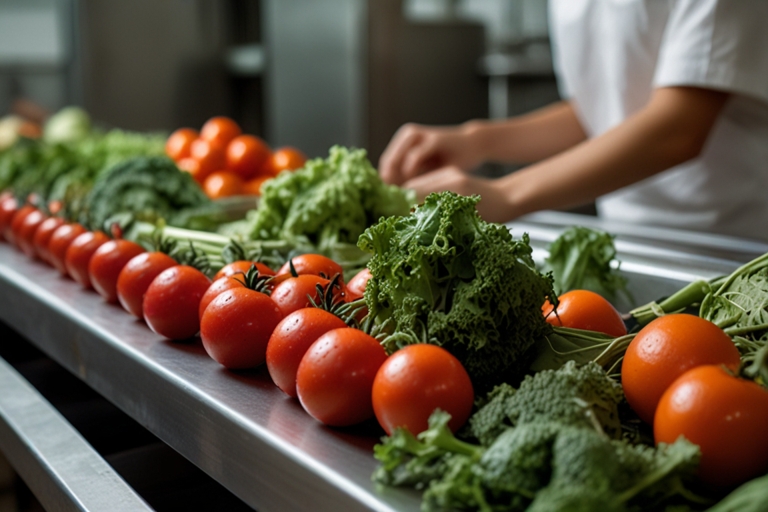
IMARC Group’s report, “Organic Food Manufacturing Plant Project Report 2025: Industry Trends, Plant Setup, Machinery, Raw Materials, Investment Opportunities, Cost and Revenue,” offers a comprehensive guide for establishing a manufacturing plant. The organic food manufacturing plant report offers insights into the manufacturing process, financials, capital investment, expenses, ROI, and more for informed business decisions.
Organic Food Manufacturing Plant Project Report Summary: –
- Comprehensive guide for setting up a organic food manufacturing plant.
- Covers market trends and industry outlook for 2025.
- Detailed project setup, including unit operations and processes.
- Raw material and utility requirements.
- Infrastructure and machinery specifications.
- Workforce and staffing requirements.
- Packaging and transportation details.
- Financial aspects: investment opportunities, cost analysis, and revenue projections.
In addition to covering operational aspects, the report offers detailed insights into the organic food manufacturing plant process and project economics.
- Detailed insights into the organic food manufacturing plant
- In-depth project economics and financial metrics.
- Covers capital investments and project funding.
- Analysis of operating expenses and income projections.
- Breakdown of fixed and variable costs, direct and indirect expenses.
- Evaluation of ROI (Return on Investment) and NPV (Net Present Value).
- Profit and Loss account analysis.
- Comprehensive financial analysis for decision-making.
- Provides a roadmap for successfully establishing a organic food manufacturing
Request for a Sample Report: https://www.imarcgroup.com/organic-food-manufacturing-plant-project-report/requestsample
What is Organic Food?
Organic food refers to any edible item cultivated without synthetic herbicides, pesticides, or genetically modified organisms (gmos). it emphasizes sustainable farming practices that prioritize soil health, biodiversity, and ecological balance. organic farmers use natural fertilizers and crop rotation to maintain soil fertility, which enhances the nutritional value of food. organically grown food often contains lower nitrate levels and higher amounts of omega fatty acids, vitamins, iron, and carotenoids, which contribute to heart health and a stronger immune system. beyond personal health benefits, organic food production also supports farmers and the economy by promoting sustainable and eco-friendly methods. these practices reduce the carbon footprint associated with food production, making organic farming a crucial component of environmental conservation efforts.
Market Trends and Drivers:
The growing awareness of the harmful effects of synthetic pesticides and gmos has significantly increased the demand for organic food, making it one of the primary drivers of market growth. additionally, the rising prevalence of chronic diseases has led consumers to seek healthier dietary options, further fueling the organic food industry. the expansion of e-commerce and home delivery services has made organic products more accessible, contributing to their rising popularity. another key factor is the increasing adoption of organic farming practices, which not only enhance biodiversity and soil health but also help reduce pollution. major corporate investments in agritech and sustainable agribusiness models, along with the widespread use of bio-based fertilizers, are shaping the future of the industry. as farm mechanization continues to evolve, it is expected to further strengthen the organic food market in the years to come.
Key Insights Covered in the Organic Food Manufacturing Plant Report
Market Coverage:
- Market Trends: Analysis of current and emerging trends in the organic food market.
- Market Segmentation: Breakdown of the market by different segments.
- Regional Analysis: Distribution and performance of the market across various regions.
- Price Analysis: Evaluation of pricing trends for organic food.
- Impact of COVID-19: Examination of the effects of the COVID-19 pandemic on the organic food market.
- Market Forecast: Outlook and projections for the organic food industry.
Key Aspects Required for Setting Up a Organic Food Plant
Detailed Process Flow:
- Product Overview: Comprehensive description of the organic food product and its characteristics.
- Unit Operations Involved: Step-by-step breakdown of the various operations in the production process.
- Mass Balance and Raw Material Requirements: Calculations for material inputs and outputs, along with required quantities of raw materials.
- Quality Assurance Criteria: Standards and procedures to ensure the quality of the final product.
- Technical Tests: Essential tests and evaluations to maintain product consistency and compliance.
Project Details, Requirements, and Costs Involved
- Land, Location, and Site Development: Assessment of land requirements, optimal location selection, and site development costs.
- Plant Layout: Design and layout planning for efficient plant operations.
- Machinery Requirements and Costs: Identification of machinery needed, along with the associated costs.
- Raw Material Requirements and Costs: Determination of the types and quantities of raw materials required and their costs.
- Packaging Requirements and Costs: Specifications for packaging materials and equipment, including associated expenses.
- Transportation Requirements and Costs: Logistics planning and cost estimation for the transportation of raw materials and finished products.
- Utility Requirements and Costs: Analysis of utility needs (such as water, electricity, and fuel) and their associated costs.
- Human Resource Requirements and Costs: Workforce planning, including staffing needs, roles, and costs for labor and management.
Project Economics
- Capital Investments: Initial costs required for setting up the organic food manufacturing plant, including land, equipment, and infrastructure.
- Operating Costs: Ongoing expenses for running the plant, such as raw materials, labor, utilities, and maintenance.
- Expenditure Projections: Detailed forecasts of all costs over the short and long term.
- Revenue Projections: Expected income generated from the sale of organic food and by-products.
- Taxation and Depreciation: Analysis of tax obligations, incentives, and asset depreciation over time.
- Profit Projections: Estimated profitability based on costs, revenues, and market conditions.
- Financial Analysis: Comprehensive evaluation of the plant’s financial viability, including cash flow analysis, return on investment (ROI), and break-even point.
Ask Analyst for Customization: https://www.imarcgroup.com/request?type=report&id=22046&flag=C
Customization Options Available:
- Plant Location: Selection of optimal location for the plant.
- Plant Capacity: Customization based on desired production capacity.
- Machinery: Choice between automatic, semi-automatic, or manual machinery.
- List of Machinery Providers: Identification of suitable machinery suppliers.
Key Questions Addressed in This Report:
- How has the organic food market performed so far and how will it perform in the coming years?
- What is the market segmentation of the global organic food market?
- What is the regional breakup of the global organic food market?
- What are the price trends of various feedstocks in the organic food industry?
- What is the structure of the organic food industry and who are the key players?
- What are the various unit operations involved in an organic food manufacturing plant?
- What is the total size of land required for setting up an organic food manufacturing plant?
- What is the layout of an organic food manufacturing plant?
- What are the machinery requirements for setting up an organic food manufacturing plant?
- What are the raw material requirements for setting up an organic food manufacturing plant?
- And more…
How IMARC Can Help?
IMARC Group is a global management consulting firm that helps the world’s most ambitious changemakers to create a lasting impact. The company provide a comprehensive suite of market entry and expansion services. IMARC offerings include thorough market assessment, feasibility studies, company incorporation assistance, factory setup support, regulatory approvals and licensing navigation, branding, marketing and sales strategies, competitive landscape and benchmarking analyses, pricing and cost research, and procurement research.
Services:
- Plant Setup
- Factoring Auditing
- Regulatory Approvals, and Licensing
- Company Incorporation
- Incubation Services
- Recruitment Services
- Marketing and Sales
Contact Us:
IMARC Group
134 N 4th St. Brooklyn, NY 11249, USA
Email: sales@imarcgroup.com
Tel No:(D) +91 120 433 0800
United States: +1-631-791-1145

0 Comments